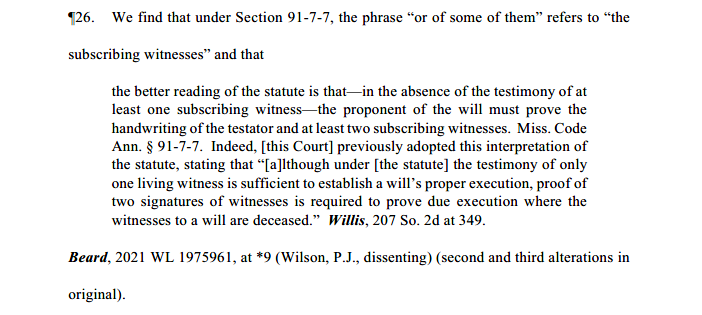The Mississippi Court of Appeals handed down nine opinions yesterday. There is just one criminal case and the rest are civil cases that run the gamut of practice areas from the statute of frauds to a hunting club dispute.
Smith v. Estate of Watson, 2023-CA-00761-COA (Civil – Wills, Trusts & Estates)
Reversing the chancellor’s judgment ordering the payment of creditor’s claims, disbursement of remaining assets, and closing the estate, holding that the chancellor failed to follow the statutory procedure for administering the insolvent estate.
(8-0: Lawrence did not participate)
Lowe v. Wall Doxey State Park, 2023-CA-00828-COA (Civil – Personal Injury)
Affirming dismissal of an MTCA personal injury case, holding that the trial court properly found that the State was not properly served with presuit notice because Plaintiff did not sent notice to the correct state entity.
(9-0)
Stallworth v. Mississippi Department of Employment Security, 2022-CC-01300-COA (Civil – State Boards & Agencies)
Affirming MDES Board of Review’s decision finding that the claimant was disqualified from receiving unemployment benefits, holding that the Board’s decision was substantial evidence and was neither arbitrary nor capricious where evidence showed that the claimant voluntarily left work without good cause.
(7-2-0: Westbrooks and McDonald concurred in result only without writing)
Mazie v. Boozier-Mazie, 2023-CA-00470-COA (Civil – Domestic Relations)
Affirming order granting a motion to enforce a judgment of divorce and finding the ex-husband in contempt and denying a new trial, holding that the chancellor acted within her discretion to find the ex-husband in contempt for not complying with the court’s judgment.
(8-0: Westbrooks did not participate)
Walker v. Hasty, 2023-CA-00675-COA (Civil – Custody)
Affirming the chancery court’s judgment modifying visitation and increasing child support obligation, holding that arguments that the trial was unfair were waived and without merit, that modifying visitation was not a change in custody, that there was substantial evidence to support the chancery court’s findings, and that the court did not prohibit one party from making a proffer and that party failed to make a proffer.
(8-0: Westbrooks did not participate)
Howard v. Nelson, 2023-CA-00947-COA (Civil – Contract)
Affirming dismissal of a case seeking specific performance enforcing an oral contract to sell land, holding that the statute of frauds applied.
(9-0)
Gandy v. State, 2023-KA-01017-COA (Criminal – Felony)
Affirming conviction of two counts of sexual battery and two counts of gratification of lust, holding that the verdict was not against the overwhelming weight of the evidence.
(9-0)
Short v. The Break Land Company, LLC, 2022-CA-01180-COA (Civil – Torts)
Affirming judgment on the pleadings in a dispute between landowners and an LLC that owned adjacent property for a hunting club of which the landowners were members that arose from the landowners wanting to shoot deer that were damaging their crops and the hunting club’s apparent retaliatory rule adoption and ultimate revocation of the landowner’s membership, holding that the landowners failed to state a claim for any causes of action, that the operating agreement barred the landowners’ claims, and that the trial court did not err not allowing the landowners to amend their complaint where they made no request of the trial court.
(8-0: Lawrence did not participate)
Long v. State, 2023-KA-00351-COA (Criminal – Felony)
Affirming conviction of possession of a controlled substance with intent to distribute, holding that the claim trial counsel committed a Batson violation was procedurally barred and without merit, that the trial court did not err in denying the motion for directed verdict, and that the spoliation argument that the State lost photographs of the crime scene was procedurally barred and without merit, and declined to address Plaintiff’s ineffective-assistance-of-counsel claim on direct appeal.
(7-2: Wilson and Emfinger concurred in part and in the result without writing)
Other Orders
- Clemmons v. State, 2022-CA-00700-COA (denying rehearing)
- Designer Custom Homes, LLC v. U.S. Coating Specialties & Supplies, LLC, 2023-CA-00207 (denying rehearing)






